Chorkies are fun, affectionate little dogs who love to go everywhere with their humans. Learn more about living with Chorkies, a Chihuahua-Yorkie hybrid dog breed.
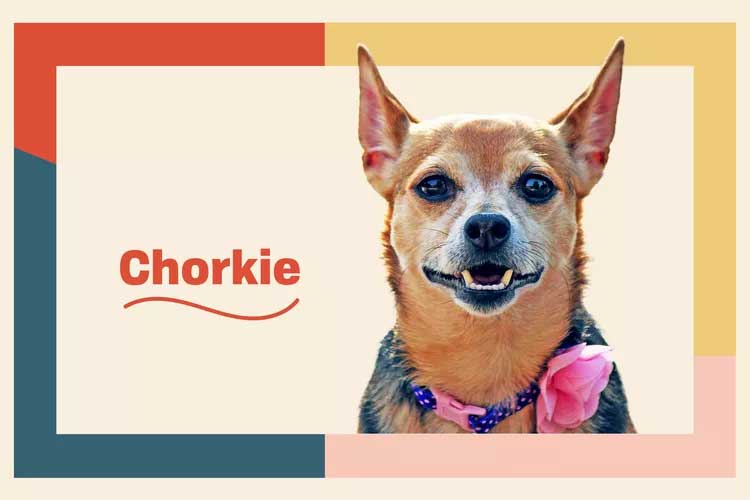
Chorkie Overview
| OFFICIAL NAME | Chorkie |
| COMMON NAME | Chorkie |
| PET HEIGHT | 6 to 9 inches |
| PET WEIGHT | 8 to 10 pounds |
| LIFESPAN | 12 to 15 years |
| GOOD WITH | cats, children, dogs, families, seniors |
| TEMPERAMENT | friendly, outgoing, playful |
| INTELLIGENCE | high |
| SHEDDING AMOUNT | infrequent |
| EXERCISE NEEDS | medium |
| ENERGY LEVEL | active |
| VOCAL LEVEL | frequent |
| DROOL AMOUNT | low |
| BREED GROUP | hybrid |
| BREED SIZE | small (0-25 lbs.) |
| COAT LENGTH | long, medium, short |
| COLORS | black, blue, brown / chocolate / liver, fawn, gold / yellow, gray, red, white |
| PATTERNS | bicolor, black and tan, blue and tan, liver and tan, tricolor |
| OTHER TRAITS | apartment-friendly, easy to groom, easy to train, good for first-time pet owners, high potential for weight gain, low prey drive, strong loyalty tendencies |
Chorkies are a small-but-mighty cross between a Yorkshire terrier and a Chihuahua. Like their parent breeds, Chorkies may be tiny, but they don't act like it! With bold personalities and plenty of affection always at the ready for their humans, they make great companion animals for just about everyone—single professionals or families with kids, apartment-dwellers or those living in sprawling homes, first-time pup parents or experienced dog owners. These happy, adaptable dogs will gladly accompany their owners wherever they go.
"Chorkies are often described as cheerful, outgoing, and affectionate dogs," says Annette Louviere, DVM, veterinarian for Wisdom Panel. "They're eager to spend time with their families and tend to bond with their human companions."
Appearance
Because Chorkies are a hybrid breed of Yorkshire terriers and Chihuahuas, these dogs can have an array of varied appearances. Like their parent breeds, full-grown Chorkies—sometimes spelled "Chorky" or "Chorki"—tend to be small in stature, weighing in around 10 pounds and standing 6–9 inches tall.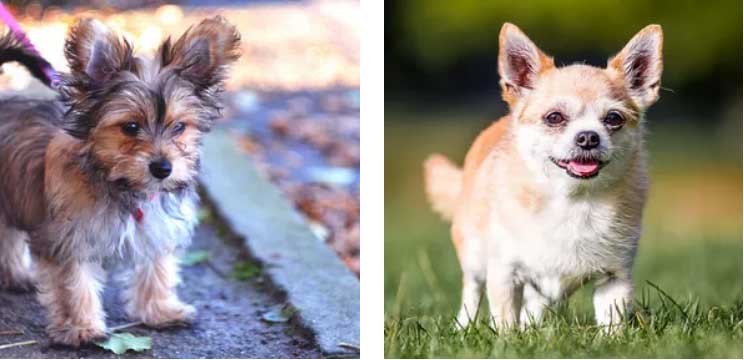
A Chorkie can inherit the long flowing locks of a Yorkie, the smooth, shiny coat of a Chihuahua, or, more likely, some combination of the two. Their eyes and noses tend to be black or dark brown, and their ears are often expressive triangles.
"Due to mixing of their ancestry, it's difficult to predict what a specific pup will be like—in both appearance and temperament," Louviere says. "And this can become even more variable if we're talking beyond first-generation Yorkie and Chihuahua crosses. However, these pups are generally small in size, with cute round eyes and upright ears, although even this can vary!"
Because of their mixed breed lineage, Chorkies also come in a range of colors and patterns. Yorkies tend to be black and tan, black and gold, blue and tan, and blue and gold, while Chihuahuas may be a range of shades and patterns in black, white, fawn, chocolate, gray, or silver. Chorkies can inherit some—or a mix of—these colors and combinations. Whether you hope to adopt a tan Chorkie or a black Chorkie, you're sure to find pups in every color combo out there.
Temperament
Chorkies are smart, sassy, and cuddly companion animals who love nothing more than spending time with their humans.These pups are energetic, but because they're so small, they're happy to play a game of fetch or tug of war in the living room before snuggling in for a nap. They'll gladly go on walks or hikes, but because of their short legs, they may need to be picked up and carried after a while.
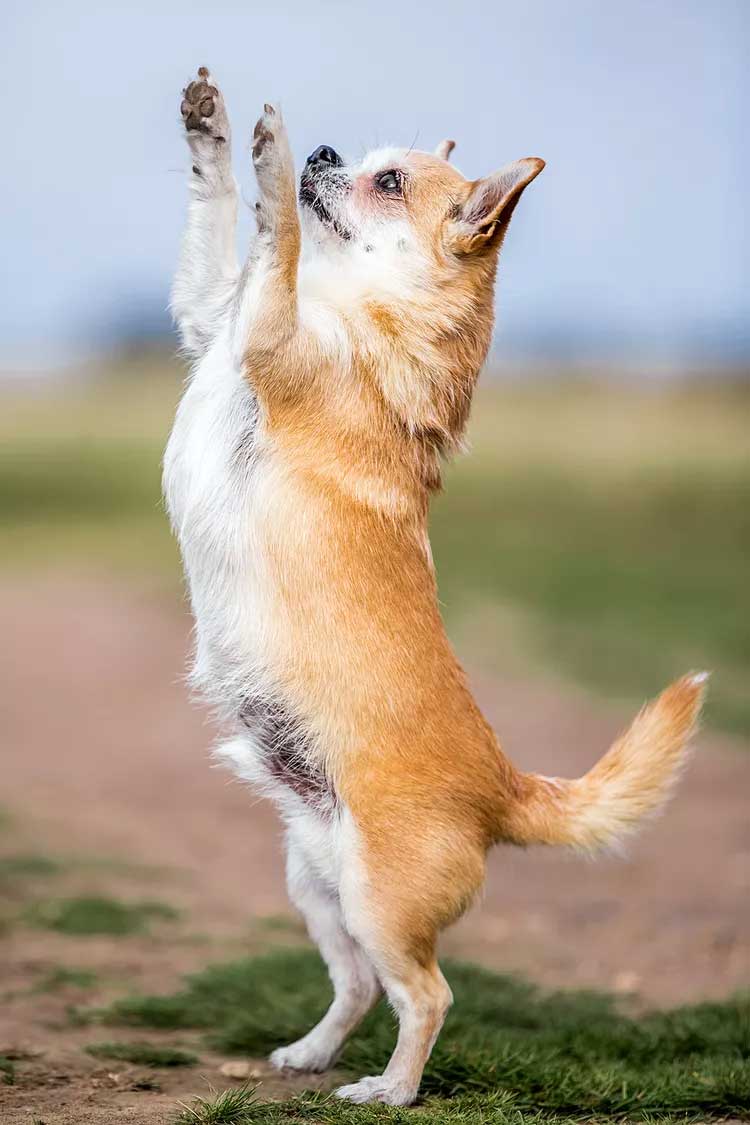
"All dogs need exercise and mental stimulation to be the best well-rounded pup they can be," Louviere says. "The great thing about small dogs like Chorkies is that this can often be satisfied through daily walks and playing, either indoors or outdoors."
Chorkies make great dogs for first-time pet-parents. That being said, they can be independent thinkers and do best with a confident human parent who can guide them in the right direction during training, offering up loads of positive reinforcement in the form of praise and treats.
Taking Chorkies to puppy training classes when they are young—or, at the very least, teaching them basic obedience skills at home—can help set this smart and spunky breed on the path to success. It's always a good idea to begin socializing your Chorkie puppy at a young age, because they can be a little skeptical when meeting new people and pets.
These pups can be quite vocal, especially when they hope to alert the household to a potential threat, like the big, scary mail carrier. But as with all chatty dogs, Chorkie barking issues can be managed with consistent training.
Living Needs
This tiny pup is incredibly versatile, which makes the Chorkie dog breed perfect for apartments or condos, as well as larger homes with fenced-in yards. As with many breeds, if you're going to let your Chorkie roam free in the yard, double-check that your fence is completely secure in case he gets curious about the outside world.Chorkies do well with kids but, as with all breeds, parents should take special care when introducing them to children. Remind children—especially young kiddos—to respect dogs' personal space and boundaries, as well as to watch where they step when a Chorkie is underfoot. Children may accidentally drop or toss a fragile Chorkie—or your pup may leap from a child's hands—so it's important to always supervise interactions between the two.
Chorkies are typically gentle with (or, frankly, will just ignore) family cats they live with. They get along well with other dogs, particularly those in their household, but may accidentally get hurt while playing.
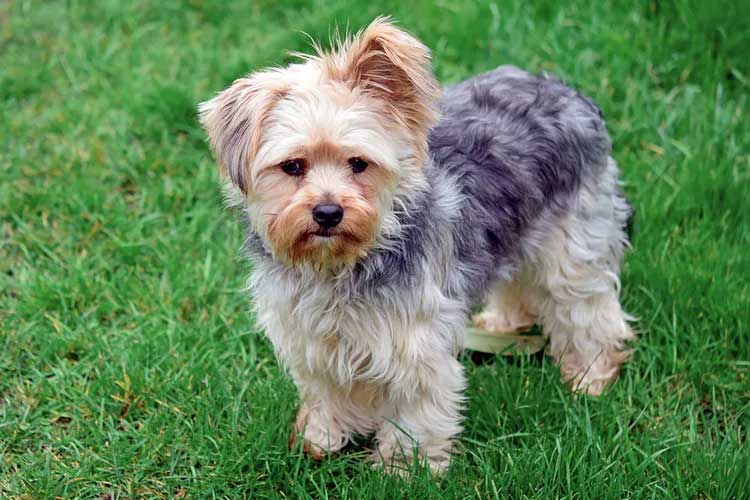
"While small stature can have benefits, there are concerns when mixing Chorkies with small children or large dogs," Louviere says. "These pups can be fragile and get hurt, even when the other party has the best of intentions."
Chorkies are model travel companions who will happily tuck into a pet carrier at your feet on an airplane or keep you company on a long road trip (and because they don't like being left alone for long periods of time, they'll be happy you brought them along!).
Care
Chorkies tend to be relatively low-maintenance dogs, though it really depends on the characteristics they inherit from their two parent breeds. Many Chorkie pet parents take their dogs to the groomer, who can give them the latest haircut style and a little pampering, but all they really need is regular brushing and occasional baths. Another perk: Chorkies don't shed much.Be sure to set aside time to brush your pup's teeth every day (or whenever you can!), and remember to keep their nails trimmed and tidy. To help stave off infections, clean your Chorkie's ears—as well as the hair in and around his ears—regularly. Your Chorkie may develop tear stains, so carefully wipe his eyes to remove discharge and debris.
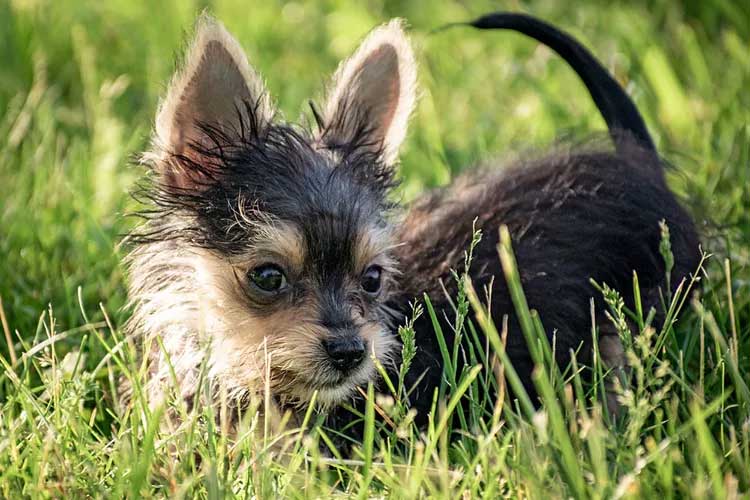
While Chorkies can tolerate warm weather fairly well, they're not so comfortable in the cold. Stock up on sweaters and coats for him to wear when the temperatures start to drop, and she'll be eternally grateful (and stylish).
Chorkies can easily become overweight. Talk to your veterinarian about proper nutrition and always read the label on your high-quality dog food to ensure you are providing your dog with the appropriate amount of food for his age and size. Remember to include treats you feed your Chorkie into his overall calorie intake for the day.
Health
Cross-breed dogs tend to inherit the same health issues and risks as their parent breeds. In the Chorkie's case, that means it's important to understand the health and longevity of Yorkshire terriers and Chihuahuas.Yorkshire terriers tend to live long, happy lives between 11–15 years, though they can face certain health issues. This breed is at risk of conditions including patella luxation, hypothyroidism, collapsing tracheas, Legg-Calve-Perthes disease, and portosystemic shunts. Like other small breeds, they also suffer from dental issues that can cause tooth loss, decay, and dental disease, which is why daily tooth-brushing and regular checkups and cleanings at the vet are so important.
His other parent breed, the Chihuahua, has an expected lifespan of 10–18 years. Chihuahuas are generally healthy, but these tiny pups can develop certain health issues too. Like Yorkies, Chihuahuas are also susceptible to patellar luxation. In addition, they may suffer from heart disease, epilepsy, folic acid deficiency, and hypoglycemia.
Responsible breeders of Yorkies and Chihuahuas, as well as Chorkie breeders, will screen parent pups for known genetic conditions before breeding. If you're on the hunt for Chorkie puppies, be sure to do your homework and only work with reputable breeders. With a clean bill of health as a puppy, regular visits to the vet, good nutrition, and plenty of exercise, you can expect your pup's lifespan to be upwards of 15 years.
History
Though no one knows exactly who first decided to cross-breed a Chihuahua with a Yorkshire terrier—or when—this breed is believed to have become popular in the United States in the 1990s, when more pet owners were searching for small dogs to call their own.The Chorkie's parent breeds have long been beloved pets. Yorkies date back to the mid-1800s, when breeders in the northern England counties of Lancashire and Yorkshire began crossing various Scottish terriers with English terriers, according to the Yorkshire Terrier Club of America. They were developed as ratters, or dogs who could chase and flush out rodents and other small mammals in textile mills and coal mines, and later became popular lap dogs for Victorian women.
Chihuahuas also have a somewhat murky backstory, though there are two widely accepted theories about their origin story, they may have evolved as descendants of the techichi, a small South and Central American dog breed. Chihuahuas were first recognized by the American Kennel Club in 1904 and rose in popularity during the 1930s, '40s, and '50s.
Fun Facts
Penny, aka the New York Fashion Dog, is a Chorkie who's amassed more than 12,000 followers on Instagram. She often posts pictures of herself wearing fashionable outfits like a leather bow tie or a fringe scarf.Aside from Chorkies, there are some other lovable Yorkshire terrier crosses—with some equally lovable names. There's the Morkie (a Maltese-Yorkie mix) the Snorkie (a Yorkie-miniature schnauzer mix) and the dorkie (a Yorkie-dachshund mix). There's also the Chorkie poo, which crosses a Chorkie with a miniature poodle.
Are Chorkies hypoallergenic? Though there's no truly hypoallergenic breed (or mixed breed) out there, Chorkies may be a good choice for allergy sufferers because of their low-shedding tendencies and the silky hair texture they inherit from their Yorkie parent.